#like the pixels of him behind geoff is literally all there is
Explore tagged Tumblr posts
Text
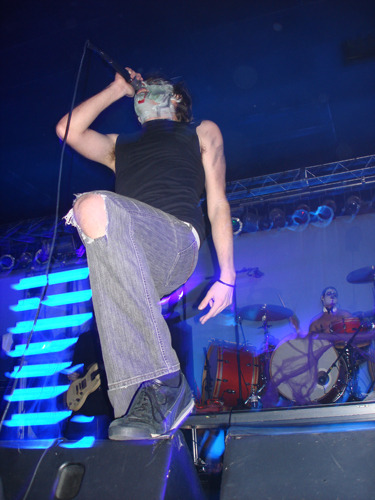


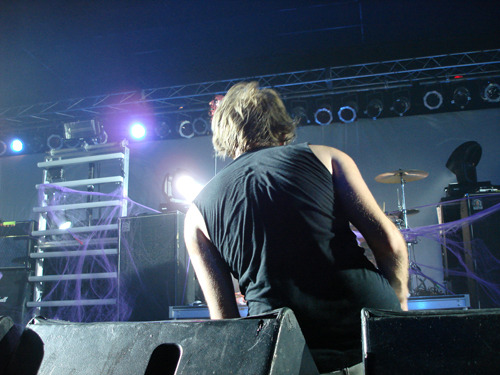
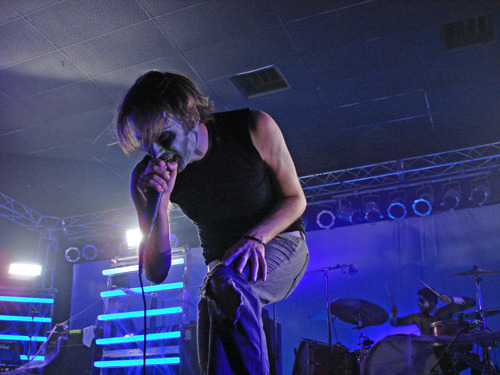
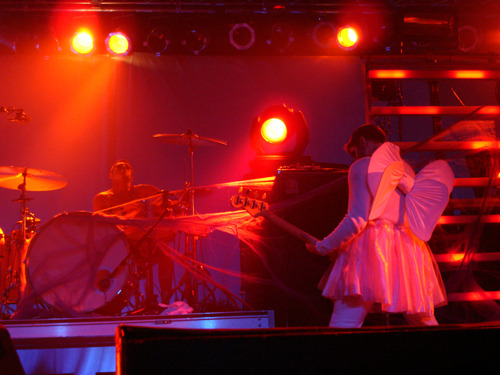

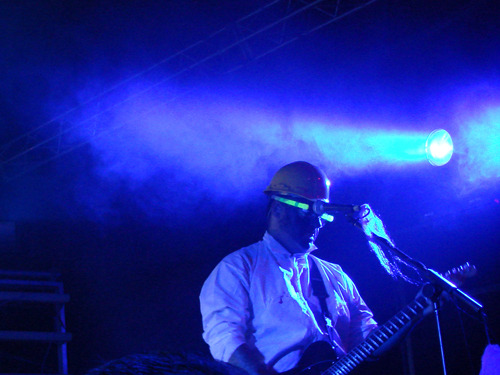


Thursday dressed up as zombies for their Halloween show at Soma in San Diego, 2006. Photos from DA user ElectricFritz
#thursday#thursday band#geoff rickly#tucker rule#tim payne#steve pedulla#i dont know why theres not a single tom image ??? like not one??? in this collection#like the pixels of him behind geoff is literally all there is#i might look to see if anyone else got pics this night#you can barely see it in the last pic but this was one of them shows where his jeans were just fucking destroyed#the fact a geoff crotchless jeans cinematic universe could be made#its more obvious in some photos i didnt include
147 notes
·
View notes
Text
Transcript of the main article under the cut. Content warning for brief discussions of death and suicide.
Standing On The Edge Of Something
Story: Jonah Bayer, Photos: Dale May
The “Summer of Screamo” may be over, but right now, all eyes are on the genres brightest hope Thursday. With their major-label debut, War All The Time, the band are attempting to do what their musical heroes couldn’t infiltrate the mainstream without compromising their art. Will success spoil Thursday or spark a musical revolution?
Try as they might, the members of Thursday can’t stop laughing. We’re 27 floors up in their publicist’s cushy corner office at Island Records’ headquarters in New York City — a place where money flows like gold records, and where there’s plenty of both. However, money is the last thing on the band members’ minds right now. They’re too busy making fun of a photographer from another music magazine who just finished shooting them.
“The guy told me to do a scissor kick, spin around like a top and scream — oh, and make sure I look sincere while I’m doing it,” singer Geoff Rickly says, barely able to get the words out.
“Remember when he said, ‘Think about fucking?”‘ guitarist Tom Keeley whispers, contorting his face into a sinister menace.
Suddenly, drummer Tucker Rule’s eyes light up. “Think about fucking?” he says in his best hillbilly voice. “I’ve been thinking about it all morning!” And, for a second, the band’s collective laughter seems loud enough to knock the Saliva and Hoobastank posters clear off the building’s walls.
But the jokes end when the video begins. The band — Rickly, Rule, Keeley, guitarist Steve Pedulla, bassist Tim Payne and auxiliary keyboardist Andrew Everding — are watching the third edit of the video for the album’s first single, “Signals Over The Air,” directed by Joakim Ahlund (the man behind Refused’s classic “New Noise” clip). Cast literally in a forest of reds and blues, the band pummel their instruments while Rickly floats omnisciently and strobe lights ignite every time the arena-worthy chorus kicks in. There’s even a short sequence where Rickly appears to be singing underwater — a shot acquired by strapping the wiry singer with lead weights and submerging him in a giant fish tank in what he calls “the most terrifying experience of my life.” It’s all striking, really. But there’s a problem.
Apparently, Pedulla, who dropped out of film school to dedicate himself to the band, thinks that when Rickly mimes the words “smaller” and “tighter,” the camera angle should follow accordingly. Everyone else groans, but the band add it to their list of complaints to discuss with the director the next day. Now, imagine that same attention applied to every note, every lyric and every pixel of the artwork for War All The Time. Then imagine that the band are being heralded as the next big thing to happen to music since, well, Nirvana, and, as the originators of screamo, the next big thing to happen to music since, well, grunge. Welcome to the wonderfully obsessive world of Thursday, a place where honest art comes before the lure of platinum plaques. Funny thing is, these guys may end up with both.
During, a ride in the label office’s elevator — complete with a flat-screen monitor forecasting the weather — Rickly admits that sometimes he feels like he’s an imposter in the mammoth corporate building, and it’s not hard to understand why.
By now, we all know the story: Suburban New Jersey kids start a hardcore band in high school and release their first album, Waiting, on the New Jersey indie label, Eyeball Records. The buzz begins, and the band are signed to Victory, which releases Full Collapse in 2001. Thursday tour relentlessly, opening for underground sensations like Saves The Day and Boy Sets Fire, and build up a core fanbase. Somehow the video for “Understanding In A Car Crash” gets picked up by MTV2, and the album eventually sells over 200,000 copies. After a major falling out with Victory (the details of which are still sketchy) and a summer stint on the 2002 Vans Warped Tour, Island/Def Jam chairman Lyor Cohen buys the band out of their Victory contract and signs them to his label.
“The moment of truth [is] the moment where there’s no agent, no record company, no publicity, no promotion man, no marketing, no anything,” explains Cohen. “That’s the moment where there’s a relationship and a connection, or a disconnect and no relationship. And it was obvious that Thursday had an intimate relationship with their fans. And that’s what drew me, that relationship, because it’s not infected by hype and record-company bullshit.”
The way Cohen spits out that last sentence, it’s tough to doubt his sincerity. But Rickly’s right: Thursday don’t fit in here. It’s hard to imagine Ja Rule stopping mid-sentence to a hug a purple-haired cubicle worker, just as it’s difficult to imagine Mariah Carey posting a clarification of her lyrics on her message board. But Thursday have never really fit in anywhere: They’ve always been too artsy and flamboyant to be a tough-guy hardcore band, but too aggressive and screamy to appeal to indie rockers.
Then, something funny happened. Through their recordings and their cathartic live shows, the outcasts who freely cast off influences ranging from Heroin to Joy Division carved their own niche in the punk subculture and unintentionally inspired countless other kids who didn’t fit into a particular scene to pick up guitars.
“Back when Full Collapse came out, Thursday played a secret show at this bar called the Loop Lounge in New Jersey, where we got our start,” recalls My Chemical Romance singer Gerard Way, one of the band’s early converts. “That performance was one of the catalysts to starting My Chemical Romance. They connected with everyone in that room, and Geoff changed that seedy bar into a resurrection, a revival. That night I said to myself, ‘This is what I need to do. I need to make a difference somehow.’”
While conquering the underground is one thing, the question remains: Is mainstream America ready for a band like Thursday? Or, maybe more accurately, is a band like Thursday ready for a place like mainstream America?
One of those priorities is the band’s unique relationship with their fans. Whether it’s reading or posting themselves on their message board (which debates everything from what type of jeans the band wear to Rickly’s personal favorite, “On a scale of gay to RuPauI, how gay is Geoff?”), the band are intent on maintaining their close-knit connection, no matter how big they get.
“To me, music has always been about communication. Where we started made that connection immediate, and that’s the thing I didn’t want to sacrifice when we started playing bigger shows,” Rickly says earnestly. “l think it’s impossible to hold onto it in the same way it was then, but I still need to have personal interaction with people who like our music. I still don’t think of it as a crowd; I think of it as a bunch of different people.”
And he means it. But the fact is that the band couldn’t play basements or even medium-sized club shows anymore if they wanted to.
“Yeah, every once in a while it feels like a concert, which is a bum-out,” Keeley admits. “But a majority of them still feel like shows — the spirit is still there.”
“The example of that was Skate And Surf [Fest 2003],” Rickly quickly adds. “We were the headlining band for over 7,000 people, and no one was mobbing me or anything. I think if we were able to do that every night, that would be an amazing thing. I’ve seen U2, and it was like that. Me sitting in the last row of Giants Stadium and seeing every person forming a chain to the back, and I was as connected as the person in the front row. And at some point, it was about being connected to all these other people.”
“That’s the most important thing, that there’s a connection there,” he continues. “It doesn’t necessarily have to be personal eye contact between you and the last person, but just the overall feeling, the love of the music being there, you know what I mean? I can’t possibly visualize that for us, but I think it’s possible. And, hopefully, if we keep doing what we’ve been doing, wherever we go, we’ll still be able to maintain some kind of personal attention.” Attention shouldn’t be a problem once people hear the band’s most realized and best album to date, War All The Time. Despite the major-label budget, it sounds undeniably like Thursday without being a repeat of Full Collapse. This time around, Everding’s keyboards are more prominent, the arrangements are more complex, and the hooks aren’t as obvious as those in sing-along favorites like “Cross Out The Eyes.” Hell, there’s even a ballad. Or two. Yet, somehow, Thursday are able to seamlessly plug these new elements into their distinctive brand of hardcore that transcends the buzzwords journalists are scrambling to tag it with.
“l think there’s sort of an unspoken thing between us,” says Pedulla, fiddling with his cell phone. “If we’re not stepping forward and pushing where we’re going musically, then what’s the point? Then it’s not fun; it’s just rewriting, rehashing. So, the minute we believe that we’re not advancing ourselves and we’re just rehashing is the minute it becomes...” He pauses. “‘Worthless’ is too strong a word...”
“A waste of time,” adds Payne.
“Yeah, it’s a waste of time at that point,” Pedulla continues. “It’s time we do something else.”
Still, one has wonder if the band are too ambitious for their own good — especially in today’s musical climate. Their first single alone contains the phrase “incandescent corsets” — a far cry from current rock stars who use words like “agreeance” and sing about sniffing panties. Are the band concerned that their subtle symbolism and grad-school vocabulary may go over most listeners’ heads?
“I think there’s a possibility that could happen, but it’s something you can’t really worry about,” says Rickly. “Sometimes, I’ll be like, ‘Oh, man, this stuff is too obscure and crazy, and people aren’t going to get it’ — but what can you do about that? It’s just the music we make. You can’t cater it, and you can’t play down to people. You can’t assume people are stupid. I’m not going to put in an extra chorus because it’s catchy or take out some bigger words because I think people won’t get them.”
He pauses before he speaks again, as if he’s running the sentence through in his head before he opens his mouth.
“You just have to say what you want, I guess,” he finally says. “At least that’s what I have to tell myself.”
Despite Ricky’s major-label advance, the modest two-story brick townhouse the singer lives in with his parents in Dumont, New Jersey, probably wouldn’t fit in on an episode of Cribs. The basement where the band wrote Full Collapse is cluttered with dictionaries and old exercise equipment, and instead of a gold record hanging in the dining room, there’s an incriminatingly embarrassing family portrait displaying a grinning only child and his parents. In fact, it might take you a couple of trips through the kitchen before you realize the photo-booth shots on the fridge of Rickly with various members of Cursive and the Field Day Fest laminate hanging inconspicuously on the key ring.
But as normal as the suburban spread appears, anyone who listens to Thursday’s music knows how Rickly’s upbringing and environment have colored his writing — specifically, the untimely deaths of so many people in his life. “So much of Full Collapse was about my friends who died really young while I was in high school,” Rickly says. “It was really weird to lose not one or two, but five.”
So he wrote about it in songs like “Understanding In A Car Crash,” “Cross Out The Eyes” and the least subtle of them all, “l Am The Killer.” Listening to Rickly cry lines like, “Hearing the words that choke memories into flatlines,” it’s clear music is his way of dealing with death — and it’s a struggle that’s far from over.
“A lot of people are going to see the title of the record and think it’s about politics, and the only really kind of politics I see it being directly about are ‘the politics of heartbreak,’“ Rickly explains the next night from a beige couch in his living room, his eyelids drooping from another long day of interviews and photo shoots. “That song [the title track] was originally ‘In The Shadow Of The New York Skyline,’ because it’s so [much] about growing up in New Jersey, in a way. But I changed it to ‘War All The Time’ because I really think that song is the climax of the record; I wanted it to be a point that everything is focused into.”
But don’t confuse the art with the artist — at least not until you finish the song. The first verse of the title track may recount a story about a friend’s sibling who died on the nearby Palisades Cliff and the suicide pact that followed. But the final verse uses the American flag as a metaphor for hope and happiness, two things that are all too often overlooked in Thursday’s music — as well as in their frontman.
People must think there’s a dark cloud over your childhood, because there are so many references to death in your lyrics.
RICKLY: Yeah, I know. It’s funny: There’s been times in my life where I felt there was a dark cloud, and I’ve had my closest friends say, “Why does this stuff keep happening to you?”
Do you feel like you fixate on death?
I feel like I fixate on everything. I don’t know; I write the lyrics to the music, though, so you can’t blame it all on me. [Laughs.] The guys write some really dark songs sometimes, and it brings me back to that place. I think that maybe the reason I do write that stuff is because if you sit here and talk to me, I don’t really feel comfortable talking about [it]. But generally, yeah, people are definitely like, “You must be a bummer to be around,” and I don’t feel I am.
As someone who’s been with you for two days straight, trust me, you’re not.
[Laughs.] The thing is I feel like there’s so much in our music that’s celebratory, too. But it’s not easily pegged, because I don’t know how to scream that from the top of my lungs without it being “Eye Of The Tiger.” I’ve never written with sarcasm or a lot of humor in our music. I find [humor] very compelling in other people’s art, but I don’t have an understanding how to make that a song. Maybe that’s just something I need to grow into, showing how many amazing things there are in my life — like having great parents, and having the freedom to say what I want and be who I want to be. In some ways, I feel like I live a totally charmed life.
The next morning, Rickly’s up early because needs to be back at the office for more press. But first, he makes me French toast and we sit at the kitchen table and wait for his girlfriend to get ready. He talks about their breakfast the day before at Cohen’s house (he still can’t believe there are skylights in the closets), and the fact that there wasn’t one mention of business during the meal — something he’s visibly proud of. And while it may be naïve to think one band can reverse all the phoniness and dollar-sign motives of the music industry, Thursday could prove that on some level, the suits and the fans both only want what’s best for the band. And maybe things aren’t so bad after all.







Thursday in Alternative Press Magazine, 2003. These turned out pretty well.
#literally article of all time#jonah bayer you will always be famous#i was going to highlight some of by favourite bits but i couldn't narrow it down enough#like you might as well read the whole thing at that point#transcript
62 notes
·
View notes